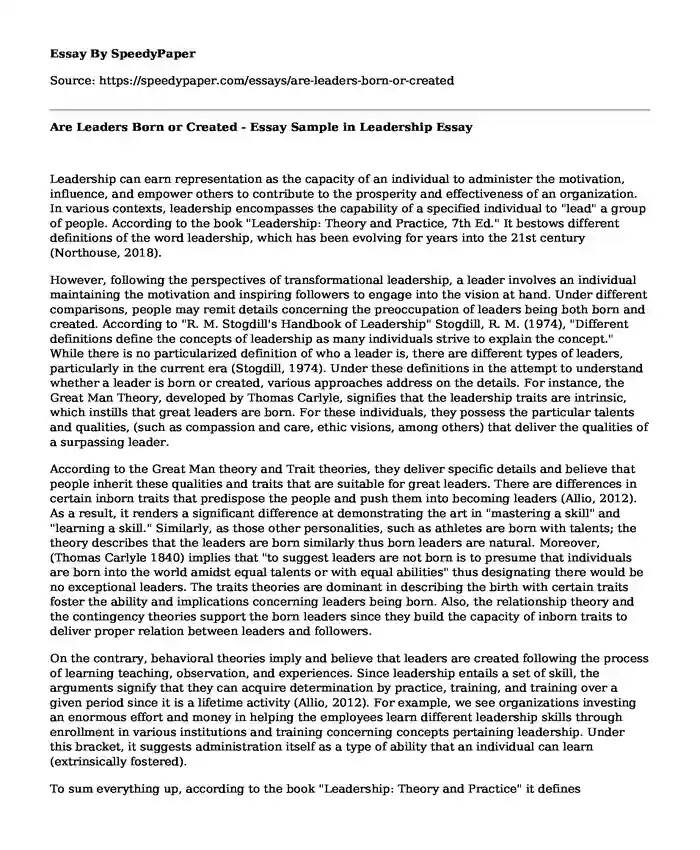
| Type of paper: | Essay |
| Categories: | Leadership analysis |
| Pages: | 3 |
| Wordcount: | 673 words |
Leadership can earn representation as the capacity of an individual to administer the motivation, influence, and empower others to contribute to the prosperity and effectiveness of an organization. In various contexts, leadership encompasses the capability of a specified individual to "lead" a group of people. According to the book "Leadership: Theory and Practice, 7th Ed." It bestows different definitions of the word leadership, which has been evolving for years into the 21st century (Northouse, 2018).
However, following the perspectives of transformational leadership, a leader involves an individual maintaining the motivation and inspiring followers to engage into the vision at hand. Under different comparisons, people may remit details concerning the preoccupation of leaders being both born and created. According to "R. M. Stogdill's Handbook of Leadership" Stogdill, R. M. (1974), "Different definitions define the concepts of leadership as many individuals strive to explain the concept." While there is no particularized definition of who a leader is, there are different types of leaders, particularly in the current era (Stogdill, 1974). Under these definitions in the attempt to understand whether a leader is born or created, various approaches address on the details. For instance, the Great Man Theory, developed by Thomas Carlyle, signifies that the leadership traits are intrinsic, which instills that great leaders are born. For these individuals, they possess the particular talents and qualities, (such as compassion and care, ethic visions, among others) that deliver the qualities of a surpassing leader.
According to the Great Man theory and Trait theories, they deliver specific details and believe that people inherit these qualities and traits that are suitable for great leaders. There are differences in certain inborn traits that predispose the people and push them into becoming leaders (Allio, 2012). As a result, it renders a significant difference at demonstrating the art in "mastering a skill" and "learning a skill." Similarly, as those other personalities, such as athletes are born with talents; the theory describes that the leaders are born similarly thus born leaders are natural. Moreover, (Thomas Carlyle 1840) implies that "to suggest leaders are not born is to presume that individuals are born into the world amidst equal talents or with equal abilities" thus designating there would be no exceptional leaders. The traits theories are dominant in describing the birth with certain traits foster the ability and implications concerning leaders being born. Also, the relationship theory and the contingency theories support the born leaders since they build the capacity of inborn traits to deliver proper relation between leaders and followers.
On the contrary, behavioral theories imply and believe that leaders are created following the process of learning teaching, observation, and experiences. Since leadership entails a set of skill, the arguments signify that they can acquire determination by practice, training, and training over a given period since it is a lifetime activity (Allio, 2012). For example, we see organizations investing an enormous effort and money in helping the employees learn different leadership skills through enrollment in various institutions and training concerning concepts pertaining leadership. Under this bracket, it suggests administration itself as a type of ability that an individual can learn (extrinsically fostered).
To sum everything up, according to the book "Leadership: Theory and Practice" it defines leadership, not as just a trait, or as the characteristic that resides in a leader, but a transactional event was occurring between the leader and the follower (Northouse, 2018). With this definition and understanding, it helps in the review as to whether leaders are born or created. Also, it renders help in the implication of a leader being born or created. In most of the cases, the issues relating to leaders and leadership implies that leadership is often a choice. An individual might be both born a leader or created; however, it seeks the preference and decision to lead.
References
Allio, R. J. (2012). Leaders and leadership-many theories, but what advice is reliable? Strategy & Leadership, 41(1), 4-14.
Northouse, P. G. (2018). Leadership: Theory and practice. Sage publications.
Stogdill, R. M. (1974). The Handbook of leadership: A survey of theory and research. New York, NY, US: Free Press.
Cite this page
Are Leaders Born or Created - Essay Sample in Leadership. (2022, Apr 20). Retrieved from https://speedypaper.com/essays/are-leaders-born-or-created
Request Removal
If you are the original author of this essay and no longer wish to have it published on the SpeedyPaper website, please click below to request its removal:
- E-government Framework Essay Sample
- Free Essay Considering Brexit as a Social Problem
- Free Essay Sample on Global Energy Sustainability
- Nursing Essay Example: Peer Interview
- Free Essay Analyzing the Themes in The Great Gatsby by Scott Fitzgerald
- Class Observation Report - Free Essay Sample
- HRM Essay Example about Performance Appraisal within PepsiCo
Popular categories




